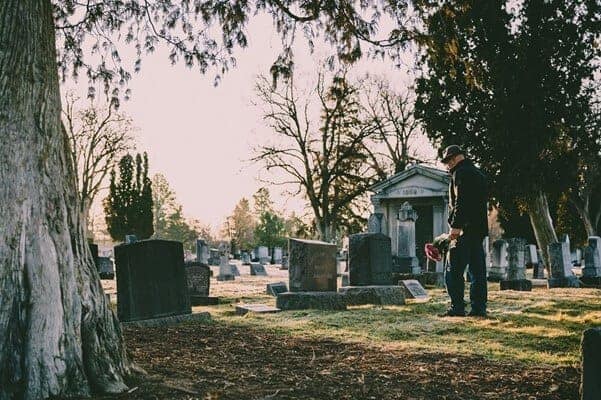Please note: Data included in this article is correct at the time of writing (October 2020), and is based on national restrictions in England. The below does not account for additional local tiered restrictions. Please follow up to date government guidance.
Across the globe, people are still adjusting to the ‘new normal’ brought about by restrictions put in place to cope with the COVID-19 pandemic. In the UK, this includes new rules about how events can take place safely. Unfortunately, the restrictions have affected funerals, which can already be a sensitive and upsetting time for the family and friends of loved ones who have passed away.
Current Funeral Guidelines
Since the beginning of the pandemic when only ten mourners were allowed to attend a funeral[i] restrictions have changed as and when needed, making them difficult to keep up with. We’ve broken down some of the basic guidelines to address frequently asked questions.
- How many people can attend a service? A maximum of 30 people can attend[ii].
- Who can come to a funeral? Both family and friends are now welcome to attend funerals.
- What are the rules on social distancing? 2 metres must be maintained between members of different households.
- Do you have to wear a face-covering? A face covering or mask must be worn during a funeral service.
The above will vary depending on local restrictions. You should always refer to your local authorities’ website if you’re unsure what you are, or are not, allowed to do.
What to expect at a funeral during COVID-19
Not knowing what to expect when attending a ‘socially distanced’ funeral can be a source of great anxiety, which is accelerated by natural feelings of grief and upset. So, what can you expect?
Social distancing. To reduce the risk of transmitting the virus, you will have to keep a 2-metre distance from family and friends who are not in your household or ‘support bubble’. Workers at the church, crematorium or other venues will help to maintain this.
Face coverings. Unless you are exempt from wearing a face covering, you will be expected to wear one.
No singing. At funerals, we usually sing a select few hymns or songs that were meaningful to the deceased. During this time, the government has advised against singing, chanting, or playing of instruments which are blown into[iii]. This reduces the chance of the virus being transmitted through the air.
Hygiene – Hand sanitiser will be provided, and you should use it upon entering and leaving the venue (if you are able to). Make sure you wash your hands for at least twenty seconds before and after attending the service.
The Logistical Impact
Logistically, the funeral industry has had to rapidly adapt to accommodate new restrictions and guidelines. With the unfortunate increase in the death rate, some processes have been streamlined for efficiency.
Direct cremations
Due to restrictions and some families not wanting more distant family members or friends to feel left out or forgotten when it comes to the funeral, many families are opting for direct cremations. This involves the deceased loved one being cremated without an official ceremony. This service has been on the increase during the pandemic[iv].
Death Registration
An unprecedented increase in excess deaths[v] has caused changes to the usual death registration process. In ‘normal’ times, a family member would visit the registrar’s office to register a death. However, the Coronavirus Act has allowed this to be carried out by funeral directors, and forms can now be submitted electronically.
When a death occurs, two doctors usually certify the death. However, If the cause of death has been identified as COVID-19, only one doctor needs to certify this. This legislation was brought in to speed up the process[vi].
Viewing the body
It may not be possible to view the body of a deceased loved one for religious or cultural purposes (or even just for closure and to say goodbye). Be prepared for this, but don’t be afraid to ask if you are allowed to spend time with the body before cremation or burial.
The Emotional Impact
Funerals are a time of great emotion and being unable to hug and comfort loved ones is nothing short of heartbreaking. COVID-19 has forced a change in the natural mourning process which people have followed for hundreds, if not thousands, of years. Alongside the usual mental and physical impacts of grief, the bereaved are experiencing the following –
- Feelings of, and physical, isolation – An unfortunate reality of the pandemic is that many people are being forced to grieve alone. Those who are physically isolated due to illness, shielding, or through precaution, are not able to lean on others to support them through their bereavement.
- Guilt – Guilt is playing a huge factor in people’s bereavement. Feelings of guilt can be raised for many reasons, from not being able to give their loved one the send-off they would have wanted, to not being able to invite all of their nearest and dearest to say goodbye
- Anger and loss of control – It’s understandable to feel angry about current limitations on funerals, who can attend and how they will be carried out. Try not to direct this anger at those around you.
- More openness about death – One sad positive that we can take from the pandemic is that people are now becoming more aware of their own mortality, and more open to talking about death. This can help surrounding family and friends to be more prepared for the eventuality, both logistically and emotionally.
If you or a loved one are struggling to cope with the emotional impact of death during COVID-19, it’s extremely important to speak out. You will be heard. There are plenty of resources online that can help you to understand and process your emotions. Here are a few: –
If you’re worried about your mental health, or that of a loved one, don’t hesitate to contact your GP. Even during this time, they will be happy to help.
Alternative ways to honour a loved one
Until restrictions have relaxed, it’s safe to say that we will have to adjust to a ‘different way’ of grieving. There are plenty of ways to help people say goodbye outside of attending a funeral, here are some ideas: –
- Lining the streets – many families are inviting those that were close to their lost loved one to line the streets (socially distanced, of course) on the day of the funeral to watch the funeral procession pass. This will offer closure, and seeing others doing the same will help people to not feel so alone in their grief
- Live streaming the service – It is becoming more popular to set up a live stream of funeral proceedings so people can watch from home and feel involved
- Video tribute – why not put together a video tribute including footage and photos of your loved one to share with friends and family? This could even include their favourite song
- Keepsakes for loved ones who couldn’t attend – making or purchasing a keepsake (a piece of ashes jewellery or a framed picture, for example) can be a special way to help someone honour a loved one who has passed on
- Somewhere to visit – whether it is a grave or a memorial bench in their favourite place, it might be an idea to set up somewhere for people to visit and remember the loved one in their own time
- Postponing the wake – The government has advised postponing wakes until a time when more people are able to attend. Gathering for a celebration of your loved ones life once restrictions have relaxed could be a lovely way to honour their memory
Overall, the impact of COVID-19 on funerals has been quite severe. It is vital to remember that the current restrictions are only temporary, and it won’t always be this way. For now, remember to stay strong and speak out about your grief to family and friends.
To ensure full understanding during these uncertain times, please refer to the relevant government guidelines for up-to-date restrictions. You can find guidance for the UK here: –
England | Wales | Northern Ireland
References
Charlie Giattino, H. R. M. R. E. O.-O. a. J. H., 2020. Excess mortality during the Coronavirus pandemic (COVID-19). [Online]
Available at: https://ourworldindata.org/excess-mortality-covid
[Accessed 17 October 2020].
Conway, H., 2020. Coronavirus is changing funerals and how we deal with the dead. [Online]
Available at: https://theconversation.com/coronavirus-is-changing-funerals-and-how-we-deal-with-the-dead-134842
[Accessed 17 October 2020].
Jones, R., 2020. No-frills cremations: how coronavirus is changing funerals in Britain. [Online]
Available at: https://www.theguardian.com/money/2020/apr/18/no-frills-cremations-coronavirus-changing-funerals-britain
[Accessed 17 October 2020].
Marjoribanks, K., 2020. Funeral changes introduced with only 10 mourners permitted graveside during coronavirus lockdown. [Online]
Available at: https://www.dailyrecord.co.uk/news/local-news/funeral-changes-introduced-only-10-21859866
[Accessed 17 October 2020].
Public Health England, 2020. COVID-19: guidance for managing a funeral during the coronavirus pandemic. [Online]
Available at: https://www.gov.uk/government/publications/covid-19-guidance-for-managing-a-funeral-during-the-coronavirus-pandemic/covid-19-guidance-for-managing-a-funeral-during-the-coronavirus-pandemic
[Accessed 17 October 2020].
Sources
[i] https://www.dailyrecord.co.uk/news/local-news/funeral-changes-introduced-only-10-21859866
[ii] https://www.gov.uk/government/publications/covid-19-guidance-for-managing-a-funeral-during-the-coronavirus-pandemic/covid-19-guidance-for-managing-a-funeral-during-the-coronavirus-pandemic
[iii] https://www.gov.uk/government/publications/covid-19-guidance-for-managing-a-funeral-during-the-coronavirus-pandemic/covid-19-guidance-for-managing-a-funeral-during-the-coronavirus-pandemic
[iv] https://www.theguardian.com/money/2020/apr/18/no-frills-cremations-coronavirus-changing-funerals-britain
[v] https://ourworldindata.org/excess-mortality-covid
[vi] https://theconversation.com/coronavirus-is-changing-funerals-and-how-we-deal-with-the-dead-134842






